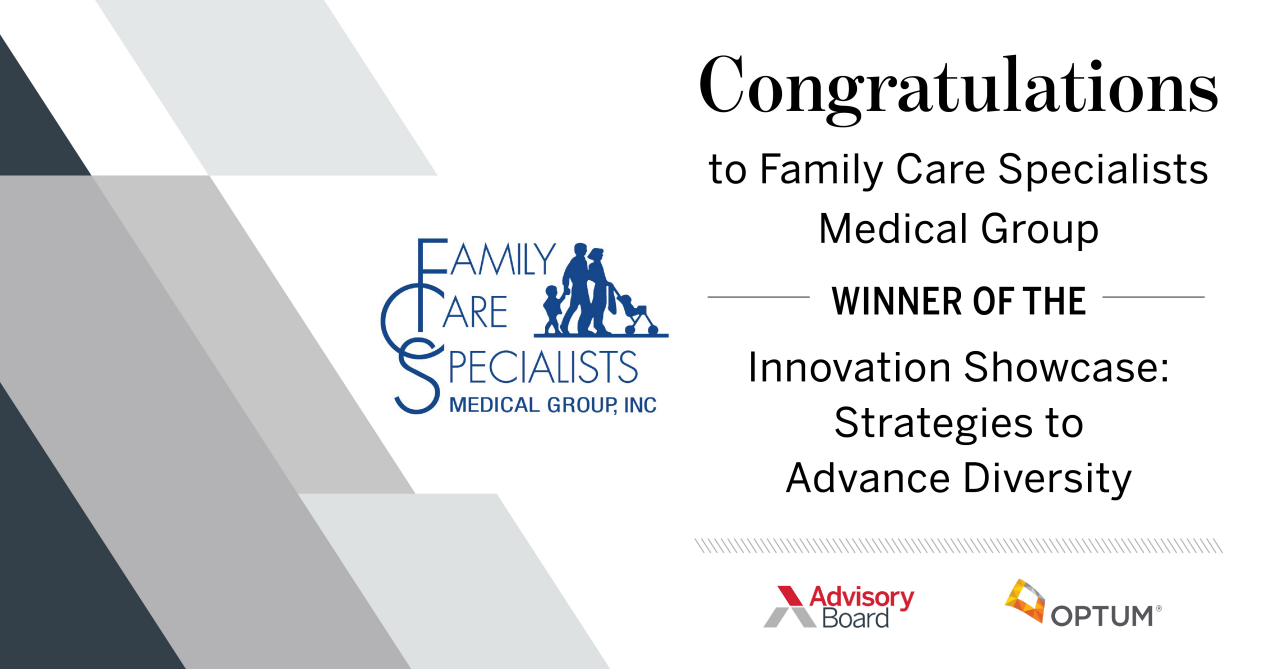Auto logout in seconds.
Continue LogoutAdvisory Board, in partnership with Optum, invited health care organizations to share innovative strategies they’ve used to successfully increase the diversity of their workforce to better reflect their community’s demographic makeup in clinical and leadership roles. Eight organizations were selected to present as finalists during the virtual event.
As the winner, Family Care Specialists Medical Group will receive a $10,000 award sponsored by Optum Social Responsibility to invest in their DEI work. Thank you to presenter Dr. Hector Flores for sharing your story.

And congratulations to:
- Second place: Montefiore Medical Center, presented by Dana Politis
- Third place: L.A. Care Health Plan, presented by William Alamo
- All eight finalists selected to present during the Innovation Showcase
Below, read a summary of each of the finalists’ innovations and see their presentation slides to learn valuable ideas to advance representation in health care at your own organization.
Presented by Cathy Reynolds, SPHR, SHRM-SCP
Legacy Health is a six-hospital, nonprofit, community-owned health system serving the greater Portland area.
In 2019, Legacy Health analyzed hiring statistics and identified that their leadership roles did not reflect the race/ethnicity demographics of the communities they serve. Legacy Health instituted a requirement that candidate pools for manager and above external recruitments must have at least 23% non-white candidates. The slate is also required to have at least two non-white candidates. Legacy Health decided not to implement a diverse interview slate requirement to avoid tokenizing non-white employees and misrepresenting Legacy’s current state. Within a year, non-white external leadership hires increased from 10% to 42% at Legacy Health, with these hires being more representative of the makeup of the local community. The accompanying hiring manager education and organization-wide culture shift also led to an increase in internal non-white leadership hires.
Presented by Christina Page, MPM, PMP and Teresa Wiley, RN, BSN, MHA
Community Care of North Carolina is a Care Management & Practice Support organization dedicated to supporting community-based health care delivery systems in NC.
The Carolina Community Tracing Collaborative (CCTC) was tasked with providing surge staffing to assist local health departments across North Carolina during the Covid-19 pandemic with contract tracing and case investigation. CCTC worked to hire and maintain a workforce that matched the Covid-19 case rate disease demographics to best support marginalized populations disproportionately impacted by the pandemic. To recruit candidates, CCTC partnered with minority- and female-owned staffing agencies, implemented an equity lens for hiring decisions, and worked closely with community partners. Community partners included Latinx advocacy organizations, HBCUs, community-based organizations, churches, and County Health Departments. CCTC trained over 3,600 individuals in public health functions. To support and retain their diverse workforce, CCTC implemented Spanish-language meetings, cultural trainings, and cultural celebrations.
Mount Sinai is a large eight-hospital, multispecialty, academic medical center based in the New York metropolitan area.
In 2015, Mount Sinai launched the Administrative Fellowship Program, a two-year program that offers hands-on administrative experience to underrepresented minority students who are recent graduates of master’s programs and are seeking entry into healthcare leadership roles. The program is unique among other administrative fellowships in that it is designed for underrepresented groups in health care, (specifically Black/African American, Hispanic/Latinx, Native American, and/or Pacific Islander); the program is two years (rather than one); and the program is managed by the Office for Diversity and Inclusion (rather than HR). Partnering with local minority serving institutions, the program has enrolled 25 individuals since its launch in 2015. 68% of these Fellows self-identify as Black/African American or Hispanic/Latinx, and 62.5% of program alumni assumed managerial roles within Mount Sinai Health System.
Presented by Dr. Hector Flores
Family Care Specialists is a high-quality safety net practice in East Los Angeles that operates health workforce programs to increase diversity, ensure placement of graduates in underserved areas, and to develop future leaders.
In response to a critical physician shortage, Family Care Specialists established a minority health professionals pipeline in partnership with local community colleges and four-year universities and launched a Family Medicine residency program. FCS also launched a practice management and leadership curriculum for the residency to recruit and retain graduates in medically underserved communities and to give them leadership skills. These programs evolved to MiMentor, officially launched in 2014, a high school-to-residency-to-medical practice pathway using a social media platform to broadcast academic enrichment and coaching. FCS has graduated 226 Family Medicine physicians, 66% of whom are direct/indirect result of FCS’ pipeline and 65% of whom are under-represented minorities. MiMentor supports over 10,000 students.
Presented by Tabitha Fineberg, MHA, MSEd and Laura Katz Leacu, MBA
Hebrew SeniorLife supports 2,500 diverse employees reaching 3,000 seniors per day along a continuum of care and services in Greater Boston.
Hebrew SeniorLife employs over 100 frontline culinary employees, most of whom are recent Haitian/Dominican immigrants. In response to feedback from entry-level staff, Hebrew SeniorLife designed the Culinary and Hospitality Immersion Program (CHIP) to offer equitable opportunities for advancement. CHIP offers these staff the opportunity to advance within their respective career ladders by providing clear competencies and standards for promotion, on-shift training, and peer mentorship. CHIP also provides basic skills training, including computer skills, English as a second language, and training in caring for patients with dementia. The program resulted in a 90% increase in entry-level culinary staff promotions over the previous year, and the increased awareness of career pathways has led some staff to pursue new career trajectories in nursing.
Download the competency models that Hebrew SeniorLife developed for culinary and hospitality roles.
Presented by Dana Politis, MPH
Located in the Bronx, New York, Montefiore Medical Center is a premier academic medical center, the primary teaching hospital of the Albert Einstein College of Medicine, and one of the 50 largest employers in New York.
The Community Workforce Programs (CWP) are a collection of employer-designed career-readiness training programs. Targeting opportunity youth (defined as young adults 14-26 who are un- or under-employed), Montefiore’s programs seek to build talent pipelines from the local community into Montefiore and the health care industry. Partnering with existing schools and community organizations, Montefiore provides holistic programming to support students’ success, including internship placements and on-the-job training. CWP also provides wrap around support to youth to address needs such as food insecurity and transportation issues. CWP has trained over 1,900 students since 2013, which has resulted in 400+ youth industry hires (at Montefiore and other health care organizations). 18% of hires receive their first promotion within two years of hire, significantly faster than the average for entry-level positions.
Presented by William Alamo
L.A. Care Health Plan is the nation’s largest publicly operated health plan serving more than 2.4 million members.
To address the shortage and lack of diversity of practicing physicians in safety net settings, L.A. Care Health Plan launched the Elevating Safety Net (ESN) initiative in 2018 with a commitment of $155M dollars over five years. Part of the ESN initiative, the Provider Loan Repayment Program (PLRP) awards primary care providers up to $180,000 in exchange for a three-year commitment to practicing in the safety net. Over 100 physicians have received a PLRP award to date, with 65% of awardees identifying with an underrepresented racial/ethnic group in medicine. 73% of PLRP awardees are eligible for the maximum $180k award, and in 2022, L.A. Care plans to extend some awards for an additional two-year commitment.
Presented by Casey Hookfin, BSN, RN, CPN
Dayton Children’s Hospital is an independent pediatric specialty health care system in Dayton, Ohio featuring 181 inpatient beds, 2 ED’s, and multiple ambulatory sites.
Dayton Children’s set a goal to increase Black bedside nurses by one percentage point each year. Dayton Children’s created the Minority Nursing Work Study Program to recruit non-white entry-level staff seeking a career in healthcare. Program participants receive a full-time salary while attending nursing school and working part-time as Patient Care Associates in return for a two-year commitment to Dayton Children’s post-graduation. Dayton Children’s began with four participants in the program and expects over 40 applicants for the next cycle. The increased focus on mentorship and career planning for Black nurses has attracted more Black nurses to Dayton Children’s, leading to an increase in Black patient-facing nurses from 1.9% to 3% of Dayton’s workforce within a year.
We know that representation in health care is crucial to improve care outcomes, decision-making, business performance, and community trust—and to ensure all employees can thrive. In recent years, health care leaders have invested more resources into creating more diverse, equitable, and inclusive workplaces for their employees. But despite stated commitment and even clear goals, there are still significant gaps in representation across the health care industry.
For example, up to 98% of senior management in health care organizations is white. Only 5.8% of active physicians identify as Hispanic and 5% as Black or African American. Only 34% of physicians are women. And while about 80% of the health care workforce is made up of women, only 19% of hospitals and 4% of healthcare companies are led by women. Further, women of color account for nearly 20 percent of entry-level health care jobs in the U.S. but only 5 percent of C-suite positions.
We’re looking for health care organizations that have implemented bold solutions to improve representation of historically marginalized and underrepresented staff in clinical and leadership roles.
Optum and Advisory Board’s commitment
Optum is committed to advancing health equity by operating without bias from within, ensuring equity for those we serve, and advancing equity across the system.
The Innovation Showcase: Strategies to Advance Diversity aims to advance equity across the system by highlighting exemplary efforts across the health care industry, convening leaders to learn from each other, and investing in one leading idea to support progress.
Don't miss out on the latest Advisory Board insights
Create your free account to access 1 resource, including the latest research and webinars.
Want access without creating an account?
You have 1 free members-only resource remaining this month.
1 free members-only resources remaining
1 free members-only resources remaining
You've reached your limit of free insights
Become a member to access all of Advisory Board's resources, events, and experts
Never miss out on the latest innovative health care content tailored to you.
Benefits include:
You've reached your limit of free insights
Become a member to access all of Advisory Board's resources, events, and experts
Never miss out on the latest innovative health care content tailored to you.
Benefits include:
This content is available through your Curated Research partnership with Advisory Board. Click on ‘view this resource’ to read the full piece
Email ask@advisory.com to learn more
Click on ‘Become a Member’ to learn about the benefits of a Full-Access partnership with Advisory Board
Never miss out on the latest innovative health care content tailored to you.
Benefits Include:
This is for members only. Learn more.
Click on ‘Become a Member’ to learn about the benefits of a Full-Access partnership with Advisory Board
Never miss out on the latest innovative health care content tailored to you.

